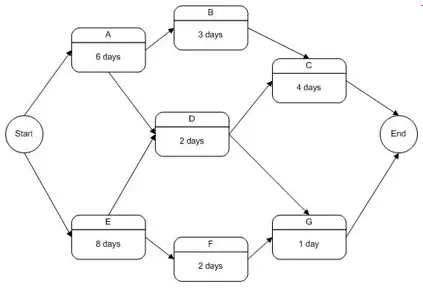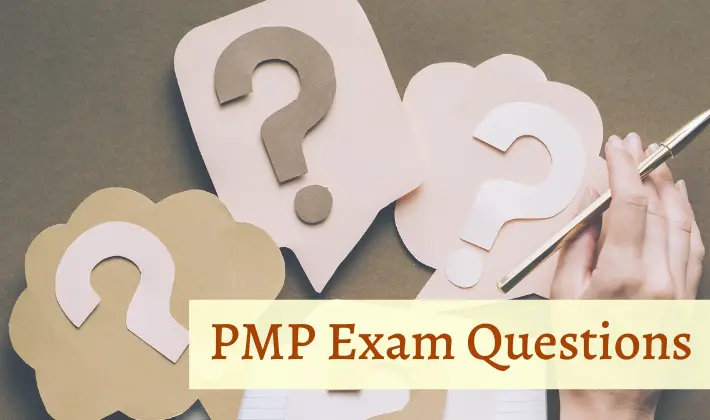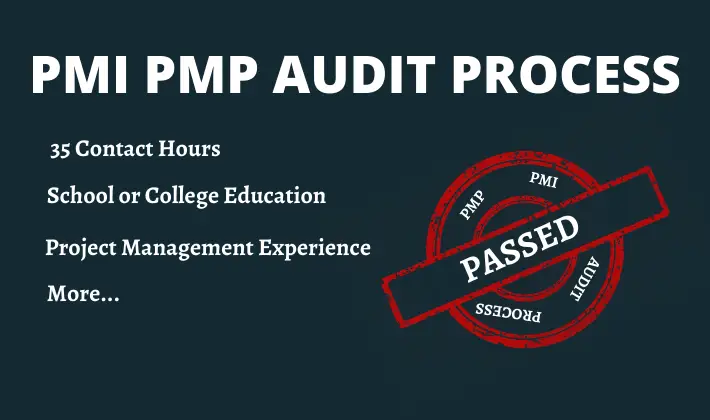Although the title of this article is titled “7 Different Type Of Questions In PMP Exam”, but this is hardly true today. Nowadays, bulk of the PMP credential test is made up of only one type – situational questions.
Gone are the days when a good portion of the PMP certification exam included other types of questions e.g. questions based on ITTO, PMBOK Guide definitions, mathematical formulas, and PMI code of ethics and professional responsibility.
You might still see one odd exam question from other types, but I would suggest you to mostly concentrate on situational questions during your PMP exam prep – do a lot of mock questions using a good practice test simulator.
Read on to find out about the 7 kind of questions that appear in the PMP (Project Management Professional) exam. Also find out how to correctly answer these questions and how many correct questions do you need to do to pass the PMP examination.
Different Type of Questions in PMP Exam
You will find seven different type of questions in the PMP credential test. Let’s understand them in detail.
1. ITTO Questions
These are based directly on the Inputs, Tools & Techniques, and Outputs (ITTO) that are listed in the PMBOK Guide (A guide to Project Management Body of Knowledge).
Example:
Which of the following is not an Output to the Close Project or Phase?
- Final report
- Formal acceptance
- Lessons learned
- Final product, service, or result
Answer & Explanation
A is the correct answer.
Refer to PMBOK Guide 6th Edition page no. 121, table no. 4.14.
This question has been taken from the PMP ITTO Quiz that is available on this blog. You can download PMP ITTO Process Chart, which will help you to answer these kind of questions.
2. Definition/Knowledge Based
These are directly based on the concepts enumerated in the PMBOK Guide. They are usually come from Process definitions or Tool and Techniques as explained in the Guide.
Example:
Which of the following technique is used for idea generation and analysis?
- Focus groups
- Mind mapping
- Affinity Diagrams
- Brainstorming
Answer & Explanation:
D is the correct answer.
Refer to PMBOK Guide 6th Edition 4.1.2.2.
This question has been taken from the PMBOK Guide Chapters Quiz that is available on this blog.
3. Mathematical/Formula Based
These are based on the formulas and mathematical concepts that are explained in the PMBOK Guide. Usually, these come from the following chapters:
- Integration Management
- Schedule Management
- Cost Management
- Quality Management
- Communication Management
- Risk Management
- Procurement Management
Example:
Given that, PV = $4000, AC = $7000, and EV = $6000.
The Project is:
- Ahead of schedule and over budget.
- Ahead of schedule and behind budget.
- Behind schedule and over budget.
- Behind schedule and under budget.
Answer & Explanation:
Option A is the correct answer.
Calculation:
SV = EV – PV = 6000 – 4000 = 2000
CV = EV – AC = 6000 – 7000 = -1000
Since Schedule Variance is positive and Cost Variance is negative, the project is ahead of schedule and over budget.
For more information on this topic, you can read my detailed article on Earned Value Analysis.
This question has been taken from the PMP Mathematics Quiz that is available on this blog. You can download PMP Formulas Cheat Sheet, which will help you to answer these kind of questions.
4. Diagram Based
These are based on the figures and diagrammatic concepts that are explained in the PMBOK Guide. Usually, these come from the following chapters:
- Schedule Management
- Risk Management
Example:

For that same network diagram, what’s the float for activity A?
- 0 days
- 1 days
- 2 days
- 4 days
Answer & Explanation
A is the correct answer.
After solving the network diagram, difference between Late Start and Early Start of activity A is 0 days.
This question too has been taken from the PMP Mathematics Quiz that is available on this blog. You can download PMP Formulas Cheat Sheet, which will help you to answer these kind of questions.
5. Data Interpretation
These are based on the data interpretation concepts that are explained in the PMBOK Guide. Usually, these come from the following chapters:
- Cost Management
- Quality Management
Sample Question:
Given figures for a Schedule Variance Control Chart
LCL: -5.9%, UCL: +5.9%
LSL: -3.9%, USL: +3.9%
10 consecutive weeks of Schedule Variance data: -3%. -2%, -1%, 0%, +1%, +2%, 3%, 4%, -4%, 6%
The project schedule can be considered out of control after week:
- 10
- 9
- 8
- 7
Answer & Explanation:
Option D is the correct answer. According to “Rule of Seven”, a process is out of control when seven consecutive points are in a upward or downward trend.
This question too has been taken from the PMP Mathematics Quiz that is available on this blog. You can download PMP Formulas Cheat Sheet, which will help you to answer these kind of questions.
6. Professional Responsibility Questions
These questions are based on the “Code of ethics & professional conduct” as defined by Project Management Institute (PMI).
PMP Exam Question:
You are submitting a proposal for an advanced technology telecom software project. The project is likely to awarded to your company as you are the sole bidder for the project. You enjoy a long and friendly relationship with the customer representative. He has advised you to increase the estimated cost by a factor of 23%. He informed you that his organization always negotiates to reduce the cost estimates by a significant amount. So, in order to get proper funds, you should inflate the cost.
What is the best way to handle this situation?
- Give an accurate estimate and don’t increase the cost. However, highlight the cost reduction as a risk in the proposal.
- Give an accurate estimate and add 23% as the contingency reserves because the risk of reduction is already known.
- Give an accurate estimate and add 23% as the management reserves because you do not want to highlight the risk of reduction in the proposal.
- Since you enjoy a good relationship with the customer representative, do not mention the cost of reduction as a risk in the proposal. Just pad up the cost for each task.
Answer & Explanation:
A is the correct answer.
As per the “PMI Code of ethics & professional conduct”, honesty is one of the core values for a project management professional.
7. Situational Questions
Situational questions are the most difficult questions in the exam. They too are based on the concepts defined in the PMBOK Guide. However, they do not not test the concepts directly. They try to test your ability to apply the project management concepts in practical scenarios. Usually, these questions are very tricky.
PMP Exam Sample Question:
You are performing schedule network analysis along with your team. You want to analyze different schedule scenarios and their impact to the project. Which of the following technique would be useful?
- Alternatives Generation
- Schedule Compression
- Delphi Technique
- What-if scenario analysis
Answer & Explanation:
D is the correct answer.
Refer to PMBOK Guide 6th Edition – section 6.5.2.4, para on What-If Scenario Analysis.
Formatting of PMP Certification Exam Questions
Before PMP exam changes in 2021, each PMP question had four choices out of which only one was correct. After the 2021 changes, questions come in one of the following formats.
- Multiple choices: Only one among the four options is correct answer.
- Multiple answers: More than one correct answers among the options.
- Matching: Match the statements in two columns.
- Hotspot: Select the correct portion of a diagram.
- Fill in the blanks with limited information: Only one among the four options is correct answer.
Examples of these formats can be found in the document relased by PMI.
How Many Questions Come in the PMP Exam?
The current exam contains a total of 180 questions out of which 175 questions are scored and 5 are not scored. The 5 questions are considered to be pre-test questions and are randomly placed in the exam.
The PMP exam questions come from three different performance domains as described in the PMP Exam Content Outline (ECO). The following represents the names of these domains and the percentage of questions that come from each domain:
- People: 42%
- Process: 50%
- Business Environment: 8%
Generally, it is believed that situational questions form the bulk of the exam but no one knows for sure if it is true as PMI keeps on changing the Exam Content Outline and the format of the exam.
Here are the estimated number of questions for each of the seven types:
- ITTO questions: less than 5
- Definition/knowledge Based: less than 5
- Mathematical/Formula Based: less than 5
- Diagram Based: less than 5
- Data Interpretation: between 5 and 10
- Professional Responsibility Questions: between 5 and 10
- Situational Questions: About 150
Note: PMI does not segregate the questions based on their type. They do it for the three domains mentioned in the Exam Content Outline. The above numbers for each type of questions is just an estimate. No one knows how many questions are actually there for each type.
How Many Correct Questions do you Need to do to Pass PMP Exam?
Before 2007, PMI used to have a definite passing criterion. A candidate was required to answer 60.6% of the questions correctly to pass the exam. After 2007, the passing criterion has become obscure.
No one, outside the PMI’s select circle, knows the passing criteria as PMI has not disclosed it. Most probably, the criteria are not based on a definite number of correct questions answered.
In the prevailing system, the PMP exam score report does not mention anything about number of correct or incorrect questions. It contains something equivalent to grades. These are called performance rating categories. There are four of them viz. above target, target, below target, needs improvement.
To successfully crack the exam, you should score more that 80% in a full length PMP practice exam.
For understanding more about this topic, you should read my other articles on passing score for the PMP exam and determine your own PMP Score.
What is the Utility of Pretest Questions in PMP Certification Exam?
The current exam contains 5 pre-test questions. These are not scored and are randomly placed throughout the exam.
PMI puts these questions in order to determine the validity and legitimacy of these questions. By asking these questions to a large number of PMP test-takers, they get to know if the questions are valid or not. If they are found to be valid, they can be used in the future tests.
How to Answer the PMP Questions?
I have written a full article on how to answer situational and other types of questions. You should read it for a complete understanding.
In brief, you can follow the following steps to answer the PMP questions.
- Read the question carefully
- If the question is long (usually PMP questions are long with redundant information) then identify the main part of the question.
- Identify the keyword(s) in the question to determine what the question is really asking.
- Determine the PG (Process Group), KA (Knowledge Area), and Process of the question.
- Eliminate the obviously incorrect choices and choose the correct option.
While answering the questions, you have to think like a project manager and not just as a PMP aspirant. You have to apply the best practices described in the PMBOK Guide in order to answer the questions correctly.
Final words
The PMP exam is one of the most difficult exams. It not only test your knowledge but also the application of that knowledge. In order to pass the exam successfully, you must read the PMBOK Guide thoroughly.
Furthermore, you should be extra careful while answering the situational questions. The best way to do PMP exam preparation is by joining a good PMP certification training program and practicing many sample questions.
Good luck.
Over to You
Which type of questions do you find the most difficult? can you share the tips and tricks that you are following to tackle these questions?


![Top 10 Advantages & Benefits Of PMP Certification [2024]](https://www.pmbypm.com/wp-content/uploads/2022/03/benefits-PMP-Certification.png)





very informative post.
https://www.pmbypm.com/pmp-exam-questions/
I have been told that the exam has changed recently and no longer contains math questions, is this true?
Hi Ian, Most probably what you say is true. Over the years the number of math q have reduced but PMI does not say anything. The PMBOK Guide contains mathematical formulas and math questions can still come in the exam.